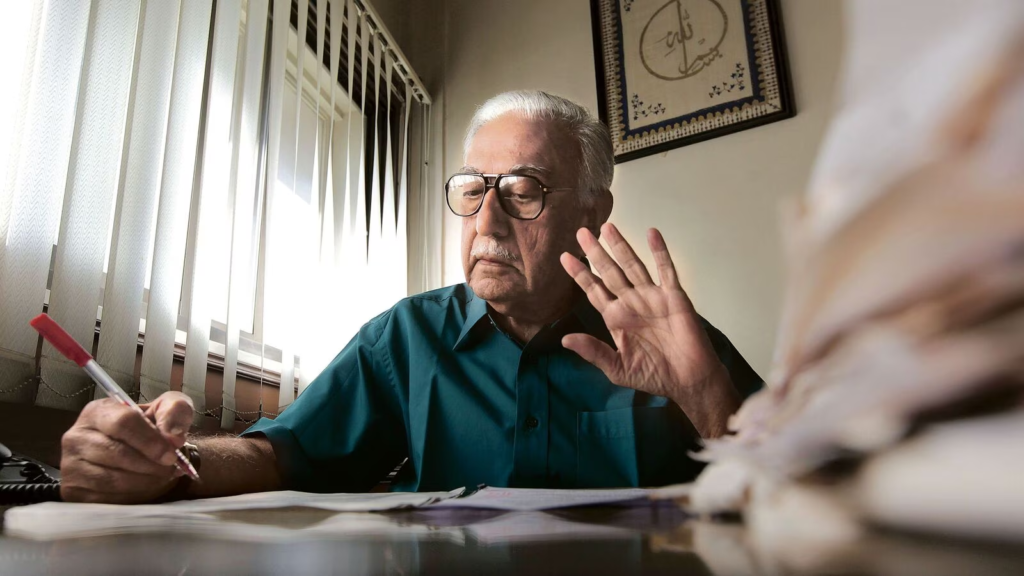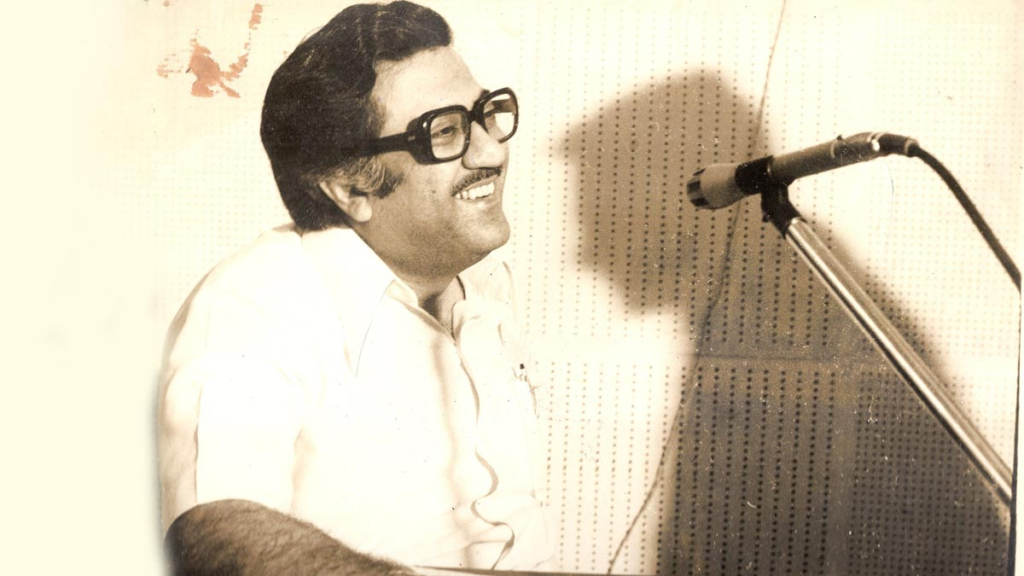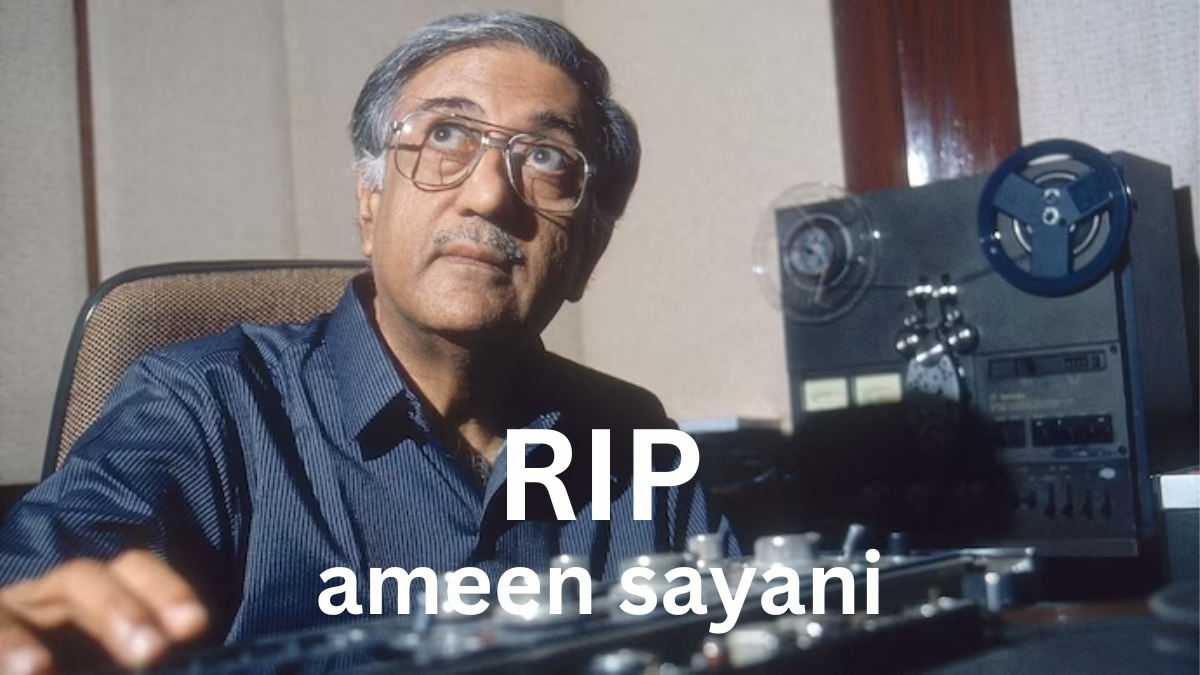Sayani’s warm, friendly tone endeared him to millions and his stock phrases became wildly popular, or went viral in today’s language.
In New Delhi, India, Ameen Sayani epitomized Bollywood and radio across three generations in India. His voice, echoing through numerous homes for over six decades, fell silent on Tuesday, marking the end of a remarkable career that commenced in the early 1950s. Ameen Sayani, who passed away in Mumbai at 91 due to a cardiac arrest, transcended being merely a presenter to his audience.
With his warm and gentle voice, he crafted a delightful and unmatched broadcasting style that made listeners feel as though a dear friend was speaking directly to them through their radios. This connection fostered a timeless bond between Bollywood melodies and his devoted followers, transcending generational divides.
“Radio was king in those days and he was the king of kings,” Anurag Chaturvedi, journalist and author, who knew Sayani well, told Al Jazeera.
Throughout his career, spanning India’s journey to independence, Sayani produced over 50,000 radio programs, voiced 19,000 jingles, hosted TV shows, and contributed voiceovers and cameos to numerous Bollywood films, frequently appearing as a radio presenter.

“When tracing India’s radio history back to 1927, the year radio was introduced in the country, one name stands out – Ameen Sayani. A musicologist, Pavan Jha, expressed that Sayani remains the sole enduring voice, a superstar whose vocal resonance seemed heaven-sent,” shared with Al Jazeera.
All India Radio (AIR), the state-owned radio broadcaster of India, is affectionately known as Akashvani, a Hindi term signifying a celestial announcement or a voice from the heavens.
Hindi-Urdu: prioritizing women with a touch of defiance.
Ameen Sayani’s radio career began with a ban.

In the winter of 1952, Balakrishna Vishwanath Keskar, India’s federal minister for information and broadcasting, excluded film songs from national broadcasts. He criticized their lyrics as irrational, vulgar, and Westernized, and viewed them as a menace to Indian classical music.
On AIR, Hindustani and Carnatic classical music replaced film songs, as announcements and news bulletins became increasingly Sanskritised.
Radio Ceylon, a radio station set up during World War II in Colombo, Sri Lanka, to bring music and news to British soldiers stationed in South Asia, saw an opportunity.
It roped in a sponsor – Binaca Top, a toothpaste brand – and a studio owner-producer, Sayani’s older brother Hamid, who was based in what was then called Bombay, and is now Mumbai.
On December 3, 1952, following Keshar’s ban a few months prior, Radio Ceylon’s powerful military transmitters broadcasted Binaca Geetmala (garland of songs) throughout Indian homes for the first time. The youthful 20-year-old Ameen Sayani greeted listeners with a cheerful and mischievous tone: “Behno aur bhaiyon, aap ki khidmat me Ameen Sayani ka adaab (Sisters and brothers, Ameen Sayani is at your service with respectful greetings).”
The show’s signature tune was from a silly but catchy Hindi film song – Pom-pom, Dhin-dhin Goes the Drum – and Sayani’s greeting was in Hindustani. A mix of Hindi-Urdu, Hindustani was the language of Bollywood films and songs, and it was the language of the people.
Sayani’s fresh, joyous style, his lilting note of defiance along with his choice to reverse the order of the traditional greetings of “brothers and sisters”, made the show an instant hit.

To know more about Ameen Sayani here
“There was gender sensitivity and Ganga-Jamuni tehzeeb in that greeting,” Chaturvedi said, referring to India’s traditionally syncretic Hindu-Muslim culture.
He was a cultural ambassador and publicist of Hindi Bollywood music
Born in 1932 in an elite Mumbai family, Sayani’s mother Kulsum Patel was a Hindu, and his father, Dr Jaan Mohamad Sayani, was a Muslim. Both were involved in India’s freedom movement.
Sayani attributed his fluency and ease in Hindustani to years spent assisting his mother in editing and printing Rahber (which means a guide in Urdu), a fortnightly journal. In an interview, he once recalled a note Mahatma Gandhi had written to his mother: “I like the mission of ‘Rahber’ to unite Hindi and Urdu. May it succeed.”
Sayani and his brother would record the Binaca Geetmala show at their Bombay studio and send magnetic tapes by plane to Radio Ceylon, outside the Indian government’s jurisdiction.
The show’s concept was straightforward: Sayani selected and played 16 Hindi film songs based on audience requests and record sales, starting from the least to the most popular. Sayani has been likened to the legendary US presenter Casey Kasem, known for his American Top 40 show. Despite expressing admiration for Kasem in later interviews, Sayani’s show actually predated Kasem’s by nearly two decades, establishing a format that would influence radio worldwide.
While the Indian government kept its airwaves clear of film songs, Sayani celebrated Bollywood songs and elevated them to a popular art form. He would introduce each song with the name of the writer, composer, and singer, and narrate an anecdote about them, their struggles and dedication.
In the late 1980s, during allegations of corruption against Amitabh Bachchan, a Congress MP, the release of his film “Shehenshah” faced delays. Despite this, the song “Andheri Raaton Mein” from the movie stayed popular for months, thanks to Binaca Geetmala, keeping the film in the public eye.
Sayani was a suave marketer too. At regular intervals, he would say, “Give me a Binaca Top smile,” promoting the sponsor’s toothpaste and connecting with his listeners.
“That timber in his voice, that immediate connect [he had] with listeners … He was more than a radio presenter. He was a cultural ambassador, an advertiser and publicist of Hindi Bollywood music,” said Jha who, like thousands of others, would sit in front of his radio set at 8pm every Wednesday with a notebook to jot down information about songs and their ranking.
“Everyone in the house would be listening to his show – women who were cooking in the kitchen, men in the living room, Bauji (grandfather) on the veranda,” Jha said.
From Jhumri Telaiya to the voice in your heart – keeping it casual yet true.
Ameen Sayani, synonymous with India’s golden radio era, not only led but also hosted other renowned shows. One such example is the weekly Bournvita Quiz Contest, a responsibility he assumed following his elder brother’s passing.
He created hundreds of 15-minute film promos for radio and sold toothpaste and headache pills on radio and TV. But apart from Bollywood, it was the dusty, nondescript town called Jhumri Telaiya that he really popularised across India.
During Binaca Geetmala, Sayani encouraged listeners to send in their beloved songs and rankings via mail, which he would share on air. This initiative sparked enthusiastic radio clubs and dedicated letter writers across the nation, even in the mica mining town of Jhumri Telaiya in the northern Indian state of Jharkhand.
Rameshwar Prasad Barnwal, a mining tycoon, was reportedly the first resident of Jhumri Telaiya to start mailing postcards with his farmaish (song request). Sayani, perhaps intrigued, read out his request and the town’s name in his sing-song style regularly on his show.
While many listeners thought Sayani had concocted this funny-sounding town as a joke, in Jhumri Telaiya letter-writing became a craze and an ego trip. Residents started sending several letters every week, reportedly even bribing postmen not to post others’ letters so that they’d have a better chance of being picked up by Sayani.
At its peak Binaca Geetmala, which eventually moved from Radio Ceylon to the All India Radio network and ran till 1994, had about 400 radio clubs and thousands of individuals writing to Sayani every day with their requests.
“He knew the art of radio announcement. He would use flowery language, play with his voice, words. But there was decency in his style … He had a lot of adab (refinement),” said Chaturvedi.
“Ameen Sayani was special. His voice stood out because it came from the heart.”







Leave feedback about this